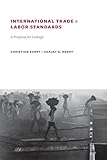International Trade and Labor Standards : A Proposal for Linkage / Sanjay Reddy, Christian Barry.
Material type: TextPublisher: New York, NY : Columbia University Press, [2008]Copyright date: ©2008Description: 1 online resource (232 p.) : 3 tablesContent type:
TextPublisher: New York, NY : Columbia University Press, [2008]Copyright date: ©2008Description: 1 online resource (232 p.) : 3 tablesContent type: - 9780231140485
- 9780231512961
- 331.202/18
- HF1379 .B375 2008
- online - DeGruyter
- Issued also in print.
| Item type | Current library | Call number | URL | Status | Notes | Barcode | |
|---|---|---|---|---|---|---|---|
 eBook
eBook
|
Biblioteca "Angelicum" Pont. Univ. S.Tommaso d'Aquino Nuvola online | online - DeGruyter (Browse shelf(Opens below)) | Online access | Not for loan (Accesso limitato) | Accesso per gli utenti autorizzati / Access for authorized users | (dgr)9780231512961 |
Frontmatter -- Contents -- List of Tables -- Preface -- Acknowledgments -- Introduction -- 1. What Is Linkage? Two Propositions -- 2. Three Types of Linkage, and What Linkage Proponents Must Show -- 3. What Linkage Opponents Must Show -- 4. Arguments Against Linkage -- 5. Ruling Out Linkage Proposals -- 6. A Constructive Procedure-Identifying Linkage Proposals That Meet the Standard Objections -- 7. Sketch of One Possible Linkage System -- 8. Conclusion -- Appendix. Empirical Evidence on the Likely Effects of Improvements in Labor Standards -- Economic Theory, WTO Rules, and Linkage -- Fine-Tuning the Linkage Proposal -- The Ethics of Political Linkage -- The Transformative Imagination and the World Trading System -- Reply to Commentators -- Notes -- Index
restricted access online access with authorization star
http://purl.org/coar/access_right/c_16ec
Progressive governments in poor countries fear that if they undertake measures to enhance real wages and working conditions, rising labor costs would cause wealthier countries to import from and invest elsewhere. Yet if the world trading system were designed to facilitate or even reward measures to promote labor standards, poor countries could undertake them without fear.In this book, Christian Barry and Sanjay G. Reddy propose ways in which the international trading system can support poor countries in promoting the well-being of their peoples. Reforms to the trading system can lessen the collective-action problem among poor countries, increasing their freedom to pursue policy that better serves the interests of their people. Incorporating the right kind of linkage between trading opportunities and the promotion of labor standards could empower countries, allowing them greater effective sovereignty and enabling them to improve the circumstances of the less advantaged. Barry and Reddy demonstrate how linkage can be made acceptable to all players, and they carefully defend these ideas against those who might initially disagree. Their volume is accessible to general readers but draws on sophisticated economic and philosophical arguments and includes responses from leading labor activists, economists, and philosophers, including Kyle Bagwell, Robert Goodin, Rohini Hensman, and Roberto Mangabeira Unger.
Issued also in print.
Mode of access: Internet via World Wide Web.
In English.
Description based on online resource; title from PDF title page (publisher's Web site, viewed 02. Mrz 2022)


